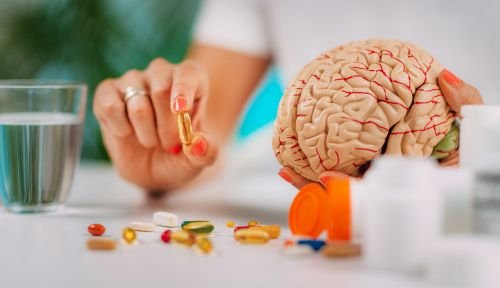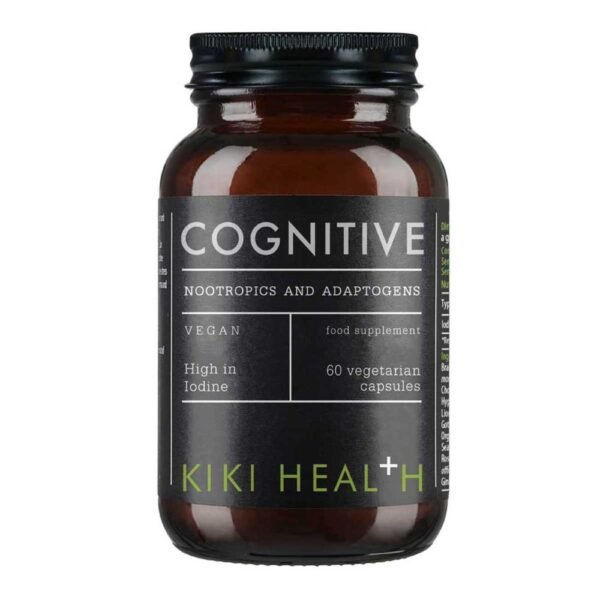Cognitive skills are the processes that allow our minds to perceive and process information. They cover a variety of functions, from focusing to problem solving. They also include memory, perception, thinking and language skills. Cognitive functions are essential in our daily lives because they enable us to think, perceive and act.1
Cognitive skills are unique to each person. Some people may find it easier to remember information, while others may find it easier to understand and apply logic. Cognitive abilities are related to the structure and function of our brains, but they can also be developed and strengthened through learning and experience.
Many researchers believe that cognitive skills are the most important component of people's ability to learn, work, and socialize. They are also essential for problem solving, decision making and everyday tasks.

The importance of cognitive skills in everyday life
Cognitive skills are integral to our daily lives. They allow us to understand and evaluate the information we receive through sight, hearing, touch, smell and taste. In addition, they help us remember information, plan and organize activities, and make decisions.
Cognitive skills are essential to our social lives. They allow us to understand and interpret other people's behavior and emotions, and to respond to them. In addition, they help us form and maintain social connections, establish and maintain friendships, and work successfully in a team.
Furthermore, cognitive skills are essential for our jobs and careers. They allow us to understand and carry out work tasks, plan and organize work, and make decisions. In addition, they help us learn and improve, as well as adapt to new situations and challenges.

Interesting facts about cognitive skills
Cognitive skills are formed and improved throughout our lives. They begin to form in infancy, when we learn to perceive and interpret the world around us. And they continue to develop throughout childhood, adolescence, and adulthood as we learn new skills, have new experiences, and face new challenges.
Some scientists believe that cognitive skills are related to our genetics. However, they also recognize that our environment and experiences also have a significant impact on our cognitive skills. For example, studying, reading, music, sports and social activities can strengthen our cognitive skills.
In addition, researchers have found that some cognitive skills can decline with age. For example, memory, concentration and decision-making may become impaired. However, other cognitive skills, such as the use of knowledge and experience in decision making, may remain stable or even improve.
How cognitive abilities affect learning and development
Cognitive abilities are fundamental to our learning and development. They allow us to perceive and process the information we receive through learning. In addition, they help us remember information, apply it in practice, and think critically and creatively.
Cognitive abilities are important to our learning effectiveness. They allow us to learn new information quickly and efficiently, as well as to use it effectively in problem solving, decision making and creative thinking. In addition, they help us adapt to new learning situations and challenges.
Furthermore, cognitive abilities are important for our personal and professional development. They allow us to improve and develop our skills, knowledge and competences. In addition, they help us plan our careers, make career decisions and adapt to career changes and challenges.

Basic cognitive skills and their role
There are many cognitive skills, and each of them has a role to play in our lives. For example, memory allows us to remember information that we receive through sight, hearing, touch, smell, and taste. Attentional focus allows us to focus on specific tasks or information, while problem-solving skills allow us to find solutions to complex problems.
Perceptual skills allow us to understand and interpret the information we receive through sight, hearing, touch, smell, and taste. Thinking skills enable us to think logically, critically and creatively and to make decisions. Language skills enable us to speak, read, write and understand language.
All these cognitive skills are related and interrelated. For example, memory and attention skills are essential to our perceptual, thinking and language skills. In addition, problem-solving skills require memory, perception, thinking, and language skills.

The most common problems related to cognitive abilities
Although cognitive abilities are essential to our lives, some people may experience problems with these skills. For example, some people may have difficulty concentrating, by memory, problem solving, perception, thinking or language.
Some problems may be related to genetics, brain structure or function, but others may be related to our environment, experiences or lifestyle. For example, stress, fatigue, diet, physical activity and social activities can affect our cognitive abilities.
Some problems can be temporary and can be resolved with time or with the right help. However, others may be permanent and require the help of specialists such as psychologists, neuropsychologists, speech therapists or physiotherapists. In addition, some problems may be related to diseases such as Alzheimer's disease, Parkinson's disease, depression or anxiety.
Strategies for improving cognitive skills
Despite the potential problems, there are many strategies that can help strengthen and improve our cognitive skills. For example, learning, reading, music, sports and social activities can strengthen our memory, concentration, problem-solving skills, perception, thinking and language.
In addition, a healthy lifestyle, including a balanced diet, regular physical activity, enough sleep, stress management and social activities, can help strengthen our cognitive skills. In addition, some research suggests that meditation, yoga, and other relaxation techniques can help improve our focus, memory, problem-solving skills, perception, thinking, and language.
In addition, there are many programs that are designed to improve cognitive skills. For example, there are computer programs, mobile phone apps, and online courses that can help improve our memory, focus, problem-solving skills, perception, thinking, and language.

Cognitive Supplements: How Do They Work?
Cognitive performance supplements, also known as nootropics, are substances that are designed to improve our cognitive skills. They can come in various forms such as tablets, capsules, powders, liquids or drinks. They can be made from various ingredients such as vitamins, minerals, plant extracts, amino acids or probiotics.
-
KIKI Health COGNITIVE - For memory and brain activity, bioactive complex, 60 vegcapsules39,90 €Rated 5.00 out of 5 based on 2 customer ratings
Cognitive performance supplements work differently depending on their composition. For example, some supplements can help improve blood flow to the brain, reduce inflammation, protect brain cells from damage, strengthen brain cell connections, or stimulate the growth of new brain cells. In addition, some supplements can help improve our memory, concentration, problem-solving skills, perception, thinking, and language.
Although some studies show that cognitive performance supplements can help improve our cognitive skills, their effectiveness can vary from person to person. Also, their safety and side effects may vary depending on the product and its quality. Therefore, it is recommended to consult a health professional before using cognitive performance supplements.

Cognitive skills training programs
Cognitive skills training programs are structured and methodically designed sessions aimed at improving specific cognitive skills such as memory, attention, problem solving, logic and creativity. These programs can be conducted in person or online and usually include a variety of exercises, games, and tasks that are designed to train specific cognitive functions.
The effectiveness of cognitive skills training programs can vary and depends on many factors, including program design, user engagement, and individual characteristics. However, research shows that these programs can benefit both children and adults by helping them improve memory, attention, problem-solving skills, and other cognitive functions.
In addition, cognitive skills training programs may benefit individuals with certain brain diseases or disorders, such as Alzheimer's disease, attention deficit/hyperactivity disorder (ADD/ADHD), or brain injuries. These programs can help them restore or compensate for impaired cognitive functions, as well as help them better cope with the challenges of everyday life.
How to measure the development of cognitive skills
There are a variety of methods and tools you can use to measure whether your cognitive skills are improving. One is to take cognitive tests before starting to use cognitive skills supplements or participate in a cognitive skills training program, and then repeat the same tests after a period of time. This way you can compare your results and see if there is an improvement.
The results of cognitive tests can provide an objective assessment of the state and progress of your cognitive functions. However, it is important to remember that these tests are only one way to measure the development of cognitive skills and may not fully reflect your actual ability to solve problems, think critically or creatively.
In addition, you can use self-observation and reflection to measure your progress in cognitive skills. You can record your observations and notes about changes in your memory, attention, problem-solving abilities, and other cognitive functions in your daily life.
The most frequently asked questions are about cognitive skills
What are cognitive abilities?
Cognitive abilities are mental processes that include thinking, memory, problem solving, concentration, and language comprehension. These abilities allow us to perceive and process our environment and information.
What does the term "cognitive" mean?
The definition of the term "cognitive" can vary depending on the context, but it generally includes the processes of thinking, perception, memory, learning, and problem solving.
How can cognitive abilities be improved?
Cognitive abilities can be enhanced in a number of ways, including thinking tasks, memory exercises, a healthy diet, adequate sleep, and physical activity.
Are there supplements that can help improve cognitive performance?
Yes, there are supplements on the market, such as KIKI Health Cognitive, that can help improve cognitive performance.
Does age affect cognitive ability?
Yes, some cognitive abilities may decline with age, but there are various ways to maintain and enhance mental performance.
What factors can negatively affect cognitive abilities?
Stress, lack of sleep, poor diet and lack of physical activity can negatively affect cognitive abilities.
The future and cognitive health
Cognitive health and enhancing cognitive skills are becoming increasingly important in our society, which increasingly values intelligence, information processing, and learning new skills. In addition, age-related brain changes, such as memory loss and dementia, are also becoming increasingly relevant, and we need effective ways to maintain and enhance our cognitive health.
Cognitive skills supplements and training programs can be useful tools in this process, but it is important to remember that they are only one part of the overall strategy. Cognitive health also depends on our lifestyle, such as diet, physical activity, sleep, stress and social relationships.
The future will bring more research and innovation in this area to better understand how to enhance our cognitive skills and support brain health. In the meantime, we can start now by making healthy lifestyle choices, using cognitive supplements, and participating in cognitive skills training programs to strengthen our cognitive functions and improve our quality of life.











